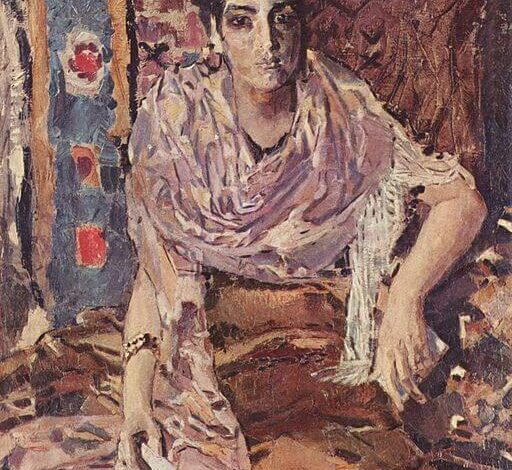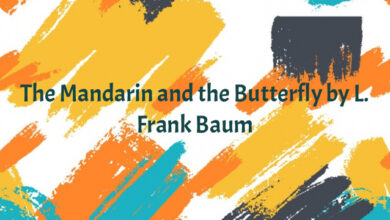
Machado de Assis – The Fortune-Teller
Hamlet observes to Horatio that there are more things in heaven and earth than are dreamt of in our philosophy. This was the selfsame explanation that was given by beautiful Rita to her lover, Camillo, on a certain Friday of November, 1869, when Camillo laughed at her for having gone, the previous evening, to consult a fortune-teller. The only difference is that she made her explanation in other words.
“Laugh, laugh. That’s just like you men; you don’t believe in anything. Well, let me tell you, I went there and she guessed the reason for my coming before I ever spoke a word. Scarcely had she begun to lay out the cards when she said to me: ‘The lady likes a certain person …’ I confessed that it was so, and then she continued to rearrange the cards in various combinations, finally telling me that I was afraid you would forget me, but that there were no grounds for my fear.”
“She was wrong!” interrupted Camillo with a laugh.
“Don’t say that, Camillo. If you only realized in what anguish I went there, all on account of you. You know. I’ve told you before. Don’t laugh at me; don’t poke fun at me….”
Camillo seized her hands and gazed into her eyes earnestly and long. He swore that he loved her ever so much, that her fears were childish; in any case, should she ever harbor a fear, the best fortune-teller to consult was he himself. Then he reproved her, saying that it was imprudent to visit such houses. Villela might learn of it, and then …
“Impossible! I was exceedingly careful when I entered the place.”
“Where is the house?”
“Near here. On Guarda-Velha Street. Nobody was passing by at the time. Rest easy. I’m not a fool.”
Camillo laughed again.
“Do you really believe in such things?” he asked.
It was at this point that she translated Hamlet into every-day speech, assuring her lover that there was many a true, mysterious thing in this world. If he was skeptical, let him have patience. One thing, however, was certain: the card reader had guessed everything. What more could he desire? The best proof was that at this moment she was at ease and content.
He was about to speak, but he restrained himself. He did not wish to destroy her illusions. He, too, when a child, and even later, had been superstitious, filled with an arsenal of beliefs which his mother had instilled, and which had disappeared by the time he reached twenty. The day on which he rid himself of all this parasitic vegetation, leaving behind only the trunk of religion, he wrapped his superstition and his religion (which had both been inculcated by his mother) in the same doubt, and soon arrived at a single, total negation. Camillo believed in nothing. Why? He could not have answered; he had not a solitary reason; he was content simply to deny everything. But I express myself ill, for to deny is in a sense to affirm, and he did not formulate his unbelief. Before the great mystery he simply shrugged his shoulders and went on.
The lovers parted in good spirits, he more happy than she. Rita was sure that she was loved; but Camillo was not only sure that she loved him, but saw how she trembled for him and even took risks, running to fortune-tellers. However much he had reproved her for this, he could not help feeling flattered by it. Their secret meeting-place was in the old Barbonos street at the home of a woman that came from Rita’s province. Rita went off through Mangueiras street, in the direction of Botafogo, where she resided; Camillo entered Guarda-Velha street, keeping his eye open, as he passed, for the home of the card reader.
Villela, Camillo and Rita: three names, one adventure and no explanation of how it all began. Let us proceed to explain. The first two were friends since earliest childhood. Villela had entered the magistracy. Camillo found employment with the government, against the will of his father, who desired him to embrace the medical profession. But his father had died, and Camillo preferred to be nothing at all, until his mother had procured him a departmental position. At the beginning of the year 1869 Villela returned from the interior, where he had married a silly beauty; he abandoned the magistracy and came hither to open a lawyer’s office. Camillo had secured a house for him near Botafogo and had welcomed him home.
“Is this the gentleman?” exclaimed Rita, offering Camillo her hand. “You can’t imagine how highly my husband thinks of you. He was always talking about you.”
Camillo and Villela looked at each other tenderly. They were true friends. Afterwards, Camillo confessed to himself that Villela’s wife did not at all belie the enthusiastic letters her husband had written to him. Really, she was most prepossessing, lively in her movements, her eyes burning, her mouth plastic and piquantly inquiring. Rita was a trifle older than both the men: she was thirty, Villela twenty-nine and Camillo twenty-six. The grave bearing of Villela gave him the appearance of being much older than his wife, while Camillo was but a child in moral and practical life…. He possessed neither experience nor intuition.
The three became closely bound. Propinquity bred intimacy. Shortly afterwards Camillo’s mother died, and in this catastrophe, for such it was, the other two showed themselves to be genuine friends of his. Villela took charge of the interment, of the church services and the settlement of the affairs of the deceased; Rita dispensed consolation, and none could do it better.
Just how this intimacy between Camillo and Rita grew to love he never knew. The truth is that he enjoyed passing the hours at her side; she was his spiritual nurse, almost a sister,—but most of all she was a woman, and beautiful. The aroma of femininity: this is what he yearned for in her, and about her, seeking to incorporate it into himself. They read the same books, they went together to the theatre or for walks. He taught her cards and chess, and they played of nights;—she badly,—he, to make himself agreeable, but little less badly. Thus much, as far as external things are concerned. And now came personal intimacies, the timorous eyes of Rita, that so often sought his own, consulting them before they questioned those of her own husband,—the touches of cold hands, and unwonted communion. On one of his birthdays he received from Villela a costly cane, and from Rita, a hastily pencilled, ordinary note expressing good wishes. It was then that he learned to read within his own heart; he could not tear his eyes away from the missive. Commonplace words, it is true; but there are sublime commonplaces,—or at least, delightful ones. The old chaise in which for the first time you rode with your beloved, snuggled together, is as good as the chariot of Apollo. Such is man, and such are the circumstances that surround him.
Camillo sincerely wished to flee the situation, but it was already beyond his power. Rita, like a serpent, was charming him, winding her coils about him; she was crushing his bones, darting her venomous fangs into his lips. He was helpless, overcome. Vexation, fear, remorse, desire,—all this he felt, in a strange confusion. But the battle was short and the victory deliriously intoxicating. Farewell, all scruple! The shoe now fitted snugly enough upon the foot, and there they were both, launched upon the high road, arm in arm, joyfully treading the grass and the gravel, without suffering anything more than lonesomeness when they were away from each other. As to Villela, his confidence in his wife and his esteem for his friend continued the same as before.
One day, however, Camillo received an anonymous letter, which called him immoral and perfidious, and warned him that his adventure was known to all. Camillo took fright, and, in order to ward off suspicion, began to make his visits to Villela’s house more rare. The latter asked him the reason for his prolonged absence. Camillo answered that the cause was a youthful flirtation. Simplicity evolved into cunning. Camillo’s absences became longer and longer, and then his visits ceased entirely. Into this course there may have entered a little self-respect,—the idea of diminishing his obligations to the husband in order to make his own actions appear less treacherous.
It was at this juncture that Rita, uncertain and in fear, ran to the fortune-teller to consult her upon the real reason for Camillo’s actions. As we have seen, the card reader restored the wife’s confidence and the young man reproved her for having done what she did. A few weeks passed. Camillo received two or three more anonymous letters, written with such passionate anger that they could not have been prompted by mere regard for virtue; surely they came from some violent rival of his. In this opinion Rita concurred, formulating, in ill-composed words of her own, this thought: virtue is indolent and niggardly, wasting neither time nor paper; only self-interest is alert and prodigal.
But this did not help to ease Camillo; he now feared lest the anonymous writer should inform Villela, in which case the catastrophe would follow fast and implacably. Rita agreed that this was possible.
“Very well,” she said. “Give me the envelopes in which the letters came, so that I may compare the handwriting with that of the mail which comes to him. If any arrives with writing resembling the anonymous script, I’ll keep it and tear it up …”
But no such letter appeared. A short time after this, however, Villela commenced to grow grave, speaking very little, as if something weighed upon his mind. Rita hurried to communicate the change to her lover, and they discussed the matter earnestly. Her opinion was that Camillo should renew his visits to their home, and sound her husband; it might be that Villela would confide to him some business worry. With this Camillo disagreed; to appear after so many months was to confirm the suspicions and denunciations of the anonymous letters. It was better to be very careful, to give each other up for several weeks. They arranged means for communicating with each other in case of necessity and separated, in tears.
On the following day Camillo received at his department this letter from Villela: “Come immediately to our house; I must talk to you without delay.” It was past noon. Camillo left at once; as he reached the street it occurred to him that it would have been much more natural for Villela to have called him to his office; why to his house? All this betokened a very urgent matter; moreover, whether it was reality or illusion, it seemed to Camillo that the letter was written in a trembling hand. He sought to establish a connection between all these things and the news Rita had brought him the night before.
“Come immediately to our house; I must talk to you without delay,” he repeated, his eyes staring at the note.
In his mind’s eye he beheld the climax of a drama,—Rita cowed, weeping; Villela indignant, seizing his pen and dashing off the letter, certain that he, Camillo, would answer in person, and waiting to kill him as he entered. Camillo shuddered with terror; then he smiled weakly; in any event the idea of drawing back was repugnant to him. So he continued on his way. As he walked it occurred to him to step into his rooms; he might find there a message from Rita explaining everything. But he found nothing, nobody. He returned to the street, and the thought that they had been discovered grew every moment more convincing; yes, the author of the previous anonymous communications must have denounced him to the husband; perhaps by now Villela knew all. The very suspension of his calls without any apparent reason, with the flimsiest of pretexts, would confirm everything else.
Camillo walked hastily along, agitated, nervous. He did not read the letter again, but the words hovered persistently before his eyes; or else,—which was even worse—they seemed to be murmured into his ears by the voice of Villela himself. “Come immediately to our house; I must talk to you without delay.” Spoken thus by the voice of the other they seemed pregnant with mystery and menace. Come immediately,—why? It was now nearly one o’clock. Camillo’s agitation waxed greater with each passing moment. So clearly did he imagine what was about to take place that he began to believe it a reality, to see it before his very eyes. Yes, without a doubt, he was afraid. He even considered arming himself, thinking that if nothing should happen he would lose nothing by this useful precaution. But at once he rejected the idea, angry with himself, and hastened his step towards Carioca square, there to take a tilbury. He arrived, entered and ordered the driver to be off at full speed.
“The sooner the better,” he thought. “I can’t stand this uncertainty.”
But the very sound of the horse’s clattering hoofs increased his agitation. Time was flying, and he would be face to face with danger soon enough. When they had come almost to the end of Guarda-Velha street the tilbury had to come to a stop; the thoroughfare was blocked by a coach that had broken down. Camillo surveyed the obstruction and decided to wait. After five minutes had gone by, he noticed that there at his left, at the very foot of the tilbury, was the fortune teller’s house,—the very same as Rita had once consulted. Never, as at this moment, had he so desired to believe in card-reading. He looked closer, saw that the windows were closed, while all the others on the street were opened, filled with folks curious to see what was the matter. It looked for all the world like the dwelling of indifferent Fate.
Camillo leaned back in his seat so as to shut all this from view. His excitement was intense, extraordinary, and from the deep, hidden recesses of his mind there began to emerge spectres of early childhood, old beliefs, banished superstitions. The coachman proposed another route; he shook his head and said that he would wait. He leaned forward to get a better look at the card-reader’s house … Then he made a gesture of self-ridicule: it had entered his mind to consult the fortune-teller, who seemed to be hovering over him, far, far above, with vast, ash-colored wings; she disappeared, reappeared, and then her image was lost; then, in a few moments, the ash-colored wings stirred again, nearer, flying about him in narrowing circles … In the street men were shouting, dragging away the coach.
“There! Now! Push! That’s it! Now!”
In a short while the obstruction was removed. Camillo closed his eyes, trying to think of other things; but the voice of Rita’s husband whispered into his ears the words of the letter: “Come immediately …” And he could behold the anguish of the drama. He trembled. The house seemed to look right at him. His feet instinctively moved as if to leave the carriage and go in … Camillo found himself before a long, opaque veil … he thought rapidly of the inexplicability of so many things. The voice of his mother was repeating to him a host of extraordinary happenings; and the very sentence of the Prince of Denmark kept echoing within him:
“There are more things in heaven and earth, Horatio, Than are dreamt of in our philosophy.” What could he lose by it, if…?
He jumped out to the pavement, just before the fortune-teller’s door; he told the driver to wait for him, and hastened into the entry, ascending the stairs. There was little light, the stairs were worn away from the many feet that had sought them, the banister was smooth and sticky; but he saw and felt nothing. He stumbled up the stairs and knocked. Nobody appearing, he was about to go down; but it was too late now,—curiosity was whipping his blood and his heart beat with violent throbs; he turned back to the door, and knocked once, twice, three times. He beheld a woman; it was the card-reader. Camillo said that he had come to consult her, and she bade him enter. Thence they climbed to the attic by a staircase even worse than the first and buried in deeper gloom. At the top there was a garret, ill lighted by a small window. Old furniture, somber walls, and an air of poverty augmented, rather than destroyed, the prestige of the occupant.
The fortune-teller told him to be seated before the table, and she sat down on the opposite side with her back to the window, so that whatever little light came from without fell full upon Camillo’s face. She opened a drawer and took out a pack of worn, filthy cards. While she rapidly shuffled them she peered at him closely, not so much with a direct gaze as from under her eyes. She was a woman of forty, Italian, thin and swarthy, with large, sharp, cunning eyes. She placed three cards upon the table, and said:
“Let us first see what has brought you here. The gentleman has just received a severe shock and is in great fear …”
Camillo, astonished, nodded affirmatively.
“And he wishes to know,” she continued, “whether anything will happen to him or not …”
“To me and to her,” he explained, excitedly.
The fortune-teller did not smile; she simply told him to wait. She took the cards hastily once more and shuffled them with her long tapering fingers whose nails were so long and unclean from neglect; she shuffled them well, once, twice, thrice; then she began to lay them out. Camillo’s eyes were riveted upon her in anxious curiosity.
“The cards tell me …”
Camillo leaned forward to drink in her words one by one. Then she told him to fear nothing. Nothing would happen to him or to the other. He, the third, was aware of nought. Nevertheless, great caution was indispensable; envy and rivalry were at work. She spoke to him of the love that bound them, of Rita’s beauty … Camillo was bewildered. The fortune-teller stopped talking, gathered the cards and locked them in the drawer.
“The lady has restored peace to my spirit,” he said, offering her his hand across the table and pressing that of the card-reader.
She arose, laughing.
“Go,” she said. “Go, ragazzo innamorato …”[4]
And arising, she touched his head with her index finger. Camillo shuddered, as if it were the hand of one of the original sybils, and he, too, arose. The fortune-teller went to the bureau, upon which lay a plate of raisins, took a cluster of them and commenced to eat them, showing two rows of teeth that were as white as her nails were black. Even in this common action the woman possessed an air all her own. Camillo, anxious to leave, was at a loss how much to pay; he did not know her fee.
“Raisins cost money,” he said, at length, taking out his pocket-book. “How much do you want to send for?”
“Ask your heart,” she replied.
Camillo took out a note for ten milreis'[5] and gave it to her. The eyes of the card-reader sparkled. Her usual fee was two milreis.
“I can see easily that the gentleman loves his lady very much … And well he may. For she loves the gentleman very deeply, too. Go, go in peace, with your mind at ease. And take care as you descend the staircase,—it’s dark. Don’t forget your hat …”
The fortune-teller had already placed the note in her pocket, and accompanied him down the stairs, chatting rather gaily. At the bottom of the first flight Camillo bid her good-bye and ran down the stairs that led to the street, while the card-reader, rejoicing in her large fee, turned back to the garret, humming a barcarolle. Camillo found the tilbury waiting for him; the street was now clear. He entered and the driver whipped his horse into a fast trot.
To Camillo everything had now changed for the better and his affairs assumed a brighter aspect; the sky was clear and the faces of the people he passed were all so merry. He even began to laugh at his fears, which he now saw were puerile; he recalled the language of Villela’s letter and perceived at once that it was most friendly and familiar. How in the world had he ever been able to read any threat of danger into those words! He suddenly realized that they were urgent, however, and that he had done ill to delay so long; it might be some very serious business affair.
“Faster, faster!” he cried to the driver.
And he began to think of a plausible explanation of his delay; he even contemplated taking advantage of this incident to re-establish his former intimacy in Villela’s household … Together with his plans there kept echoing in his soul the words of the fortune-teller. In truth, she had guessed the object of his visit, his own state of mind, and the existence of a third; why, then, wasn’t it reasonable to suppose that she had guessed the rest correctly, too? For, the unknown present is the same as the future. And thus, slowly and persistently the young man’s childhood superstitions attained the upper hand and mystery clutched him in its iron claws. At times he was ready to burst into laughter, and with a certain vexation he did laugh at himself. But the woman, the cards, her dry, reassuring words, and her good-bye—”Go, go, ragazzo innamorato,” and finally, that farewell barcarolle, so lively and gracious,—such were the new elements which, together with the old, formed within him a new and abiding faith.
The truth is that his heart was happy and impatient, recalling the happy hours of the past and anticipating those yet to come. As he passed through Gloria street Camillo gazed across the sea, far across where the waters and the heaven meet in endless embrace, and the sight gave him a sensation of the future,—long, long and infinite.
From here it was but a moment’s drive to Villela’s home. He stepped out, thrust the iron garden gate open and entered. The house was silent. He ran up the six stone steps and scarcely had he had time to knock when the door opened and Villela loomed before him.
“Pardon my delay. It was impossible to come sooner. What is the matter?”
Villela made no reply. His features were distorted; he beckoned Camillo to step within. As he entered, Camillo could not repress a cry of horror:—there upon the sofa lay Rita, dead in a pool of blood. Villela seized the lover by the throat and, with two bullets, stretched him dead upon the floor.
4 – Italian for “love-sick boy,” “young lover,” etc.
5 – In United States money ten Brazilian milreis are equivalent to about $5.50.




